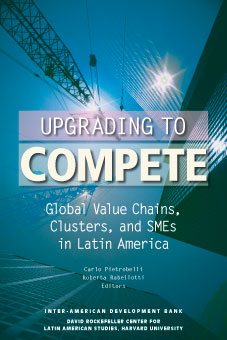Ministry of Finance, St.Lucia
I was keynote speaker at the Productivity Awareness Week in St.Lucia on the 14th of October.
Download the pdf Clusters St.Lucia
in Presentations Tags: Clusters, Innovation

I was keynote speaker at the Productivity Awareness Week in St.Lucia on the 14th of October.
Download the pdf Clusters St.Lucia
in Featured Presentations, Presentations Tags: Caribbean, Clusters, Competitiveness, Innovation

I gave a keynote speech on clusters in the Caribbean.Understanding the characteristics of clusters in the Caribbean and defining policies for their development is the basis of a timely and thought-provoking study commissioned by Compete Caribbean.
Download the pdf Trinidad Caribbean Clusters
Download the full report
in Journal Articles, Publications Tags: Clusters, Global Value Chain, Globalization, Local Development, Wind Energy
In this paper we study how globalization impacts on the structure and governance patterns of value chains and on the resilience of local clusters. We study the value chains related to two Basque (Spain) companies in the wind energy industry, Iberdrola and Gamesa, and the local cluster to which they belong. We find that firms within the cluster have different types of relationships with lead companies depending on their competences and the complexity of their products. As a consequence, firms also present different potential for growth and/or resilience: some have the capacity to internationalize their operations and/or shift to the offshore wind market, others are vulnerable to competition from providers in the emerging countries. Against this context, we discuss how the cluster responds to these challenges and the role of policy.
in Presentations Tags: Clusters, Globalization, Wind Energy
In a seminar organized by the Multilateral Investement Fund on Towards a Regional Economic Development (RED) Strategy, Rabellotti presented a paper on the Wind Energy Industry.
Download the pdf, Pres MIF 2013-04
in Journal Articles, Publications Tags: Clusters, Knowledge
Recent studies have stressed the role played by global pipelines in fostering the growth of clusters and innovativeness. In this article, we develop a formal model to investigate when global pipelines contribute to an increase in local knowledge, depending on various characteristics of clusters such as size, knowledge endowment, and the ease of transmission of internal knowledge. This model is an extension of Cowan and Jonard’s (2004) model in which we introduce the concept of cluster and a role for spatial proximity in the diffusion of knowledge. Our results reveal that there is a natural tendency of actors within global pipelines to act as external stars, rather than gatekeepers of knowledge. Global pipelines are beneficial for the accumulation of knowledge only if the cluster is either characterized by a high-quality local buzz or is small and weakly endowed in terms of knowledge.
in Journal Articles, Publications Tags: Clusters, Industrial districts, Italy
It investigates the evolution of specialization patterns for the Italian provinces over the period 1995-2005 by analysing the dynamics of the sectoral distribution in the Balassa index of revealed comparative advantages. The results show that underlying a relatively stable distribution of national comparative advantages over time, there are wide variations in local performance: only a few provinces demonstrate any stability in their specialization over the last decade, with the majority showing decreased specialization. We find a higher average degree of persistence for provinces with districts, but no systematic differences between provinces with or without industrial districts. District provinces show wide variation, with a few concentrating on their past comparative strengths, but many diversifying.
in Presentations Tags: Clusters, Global Value Chain, Small and Medium Enterprises

Key Note speech in a seminar on clusters organised by the Department of Economic Development in Abu Dhabi.
Download the pdf, Pres AbuDhabi 2010-09
in Journal Articles, Publications Tags: Clusters, Italy, Knowledge, Wine industry
The aim is to analyse the nature and extent of knowledge and information networks in an Italian wine cluster. Moreover, the relation between firms’ characteristics and the knowledge network structure is also explored. The empirical findings show that knowledge is unevenly distributed in clusters and that networks of knowledge and information differ a great deal in terms of their structure. In fact, knowledge flows are restricted to a tightly connected community of local producers, differing in terms of knowledge assets, innovation behaviour and overall economic performance with respect to the rest of the firms in the cluster.
in Presentations Tags: Clusters, Global Value Chain, Latin America, Small and Medium Enterprises
I was invited at the Knowledge Economy Forum to talk about Global Value Chains and clusters in Latin America.
Download the pdf, Pres Knowledge Economy Forum 2008-06
in Journal Articles, Publications Tags: Clusters, ICT, Industrial districts, Innovation
The aim of this study is to analyse the main determinants of the adoption and use of ICT (Information and Communication Technologies) and the relationship between ICT and the patterns of innovation in an Italian industrial district. The analysis is carried out on a database of 118 textile enterprises located in Biella, a well known industrial district specialised in medium to high quality woollen yarns and textiles, which have been interviewed following a structured questionnaire.
On the whole, the rate of adoption and use of ICT in Biella is rather low, confirming the results of other studies on industrial districts specialised in traditional sectors. Nevertheless, our analysis also shows that considering ICT as a general technology may be misleading. It is instead useful to disentangle among different ICT; in particular, there are significant differences between IT involving production, administration and logistic processes and communication technologies (CT). Moreover, we have tested on a smaller sample of 50 firms the hypothesis that adoption and use of ICT may positively influence innovation. Here, the most interesting finding is that different types of innovations, i.e. product, process and organisational innovations, are influenced by very different variables.
in Journal Articles, Publications Tags: Clusters, Industrial districts, Industrial policy, Innovation, Small and Medium Enterprises
The notion of ‘Business Development Service’ (BDS) is quickly gaining popularity among policy makers and scholars of management, industrial organization and development. Similarly, attention is increasingly paid to the institutions and centers offering BDS, as an essential part of the ‘local’ or ‘regional innovation system’. The paper analyses the experience of BDS Centres in three highly developed Italian regions, Emilia Romagna, Lombardia and Veneto, and evaluates their performance and contribution to the regional industrial, and notably SME, development. The paper is based on a survey of 30 BDS Centres and it uses quantitative together with qualitative evidence.
Download the pdf, JA WRSTSD 2007-01
in Books, Publications Tags: Brazil, Chile, Clusters, Global Value Chain, Latin America, Mexico, Nicaragua, Small and Medium Enterprises

This books investigates clusters and value chains in Latin America. Globalization imposes new conditions and rules for competitiveness in international markets. It poses the imperative to link up with other actors, both at the local and at the global level, and find new ways to interact and learn from the relationship. Can local markets and clusters represent a powerful alternative to global markets? Do transnational corporations and global buyers play a role and enhance or undermine local firms’ upgrading and learning? What opportunities do clustering and global value chains offer to SMEs in global markets?
Upgrading to Compete shows that both the local and the global dimensions matter at once. Clustering and collaborating with other local firms offers substantial advantages, while also participating in global value chains and interacting with foreign buyers and companies may enhance local firms’ capabilities and access to distant markets. However, what remarkably matters is the form of governance of value chains and clusters that importantly affects the upgrading process of local SMEs.
The book illustrates this with original empirical evidence from several clusters in Latin America. New case studies from Brazil, Chile, Mexico and Nicaragua are supplemented by desk studies on other experiences in the region.
«At a time when there is growing interest in Latin America on active production sector strategies and on the role of SMEs, Pietrobelli and Rabellotti make in this book an essential contribution. “Upgrading to Compete” is full of quality information and insights. I look forward for the introduction of many of the ideas and recommendations of this book into policy action.»
Jose Antonio Ocampo
Under-Secretary-General of the United Nations for Economic and Social Affairs
«This book offers a new way of thinking into fundamental aspects of industrial organization and international trade and exploits original case studies to develop new ideas and stylized facts.»
Michael Piore
David W. Skinner Professor of Political Economy, Massachusetts Institute of Technology
The book was reviewed in Foreign Affairs
You can buy the book here